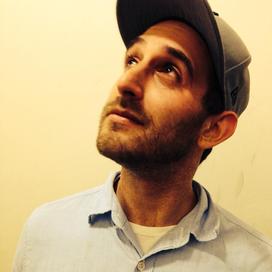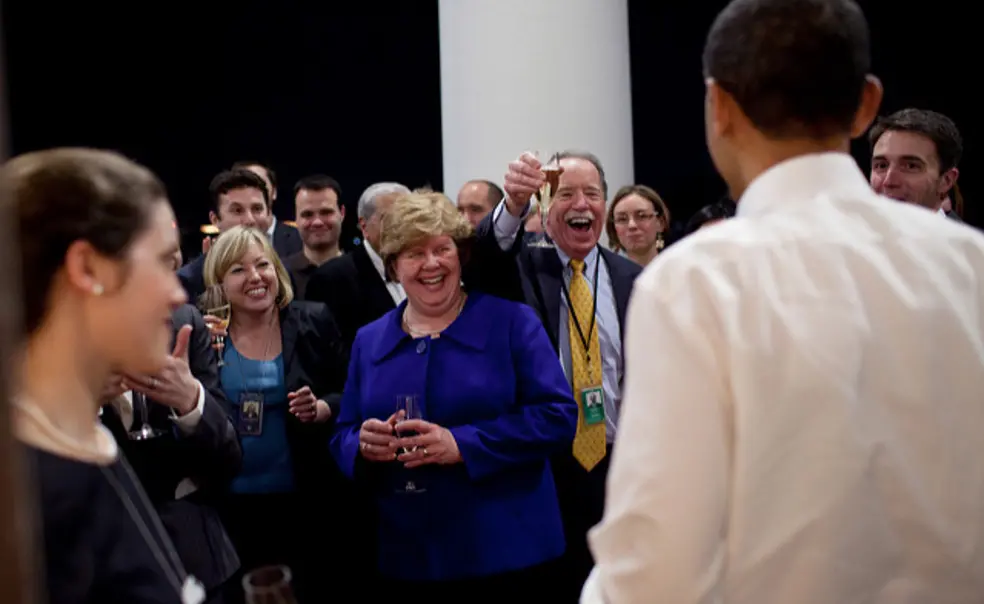I grabbed my champagne glass and we headed out to the Truman Balcony. It was near midnight at the White House and our staff had been summoned for a celebration. Through the door, I peered out over the South Lawn. The Washington Monument glowed in the night sky like a rocket ship about to blast off to the stars. It felt like a dream.
Only a couple hours earlier, I was in my pajamas, sitting on my couch with my roommates. It began as a normal Sunday night. But this night was also special. It was March 21, 2010, and, in a dogged, weekend effort, Congress had finally passed the Affordable Care Act.
My iPhone buzzed. I grabbed to check it and my eyes widened. President Obama’s personal secretary invited a group of us to join the president for champagne in the White House residence. In the months leading up to this moment, White House staffers had worked around the clock for the ACA’s passage. Our team, researchers in the Office of Communications, worked to ensure press events were executed without hiccups. President Obama might have left the celebration to his inner circle, but with his typical benevolence, he decided to share the moment with young staffers like us. Our loyal boss Liz got us on the list.
After midnight, the president walked out on the balcony for a toast. His martini glass has only become more comically large with memory. Politics was more than just rhetoric, he told us. It was more than just a horse race. We, the people, held the power to transform our country for the better — and here was actual proof. I pictured all the families who would now benefit from our improbable movement, which had been catapulted to success in the plains of Iowa just a few years before, and I felt a surge of idealism course through my veins. The president thanked us for our service and then invited us to tour the residence, drinks in hand.
The mood amongst the staff was jubilant, almost giddy. Most of us had never seen the residence before and were taken with the president’s home office in the Treaty Room and the famous Lincoln Bedroom. Approaching 2 a.m., it was time to leave. After all, we all had work the next day. As if an invitation to his home wasn’t enough, the president then personally thanked us, one by one, as we exited through the door. I remember thinking it was one of the greatest moments of my life.
It’s been more than six years since that night and I have long since left the Obama Administration. Earlier this year, my old colleague Allison was inspired to remind us of that moment again with an email. President Obama had given a Q&A on Twitter and was asked what his favorite moment at the White House was. “The night ACA passed; standing on the Truman Balcony,” he tweeted. “Knowing we’d helped millions.”
Like all events in history, the meaning of that night on the Truman Balcony shifts with time. The dysfunctions of Washington got in the way of making the ACA stronger. It stymied progress to control costs on the provider side and make it truly universal. The act was pilloried by Congress and weakened by the Supreme Court. Instead of improving upon the legislation, an acrimonious Washington sought to suffocate it.
The truth is the Affordable Care Act would have never completely fixed the system itself. It was a starting point. It was a patient’s Bill of Rights. It was a forceful declaration that all Americans are entitled to care and it marshaled means to achieve that end. Twenty million people got insurance as a result.
With the election of Donald Trump, the future of the Affordable Care Act is in jeopardy. There are legitimate concerns about rising health-care costs. In an ideal world, Republicans and Democrats would work together to address this problem with empirical evidence about what works and an earnest mission to serve the American public. My deep hope is that any changes will preserve core elements that protect people with preexisting conditions, the poor, and those unable to get coverage through their employer. These popular parts, however, require resources and government muscle.
Whatever happens with President Obama’s signature domestic legislation, I believe he will have an enormous legacy. In some ways, he secured his place in our national lore the moment we elected him as the first black president. But President Obama is more than just a shining symbol of racial progress in a democracy long marred by oppression. He was a profoundly capable, erudite, and compassionate leader who risked tremendous political capital to deliver a better life to millions of at-risk Americans. He showed the power of American democracy to achieve a better world even as the enemies of progress seek to stifle it.
That night on the Truman Balcony will always remind me of that.

This essay is part of a new series at PAW Online. If you would like to contribute to the series, contact us at paw@princeton.edu.












No responses yet